新目标英语人教版九年级中考复习资料
人教新目标版九年级英语全册中考考纲词汇详解:Unit 2 I think that mooncakes are delicious!
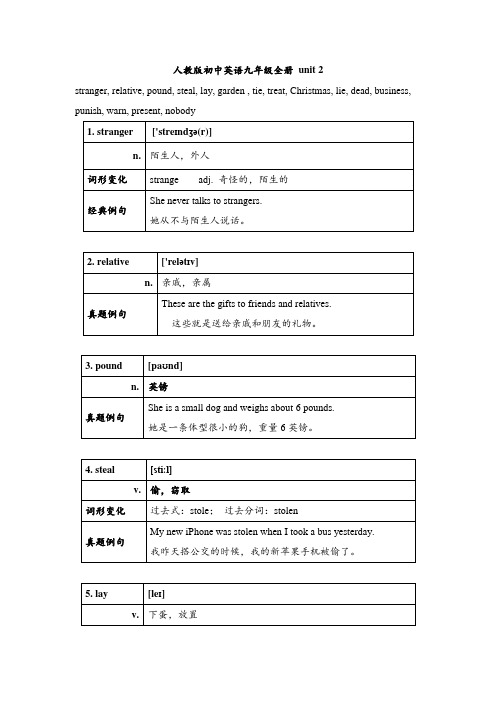
如果你感觉不舒服,就躺下休息吧。
11.dead
[ded]
adj.
死的,无生命的
词形变化
die v.死,去世
death n.死亡
dying adj.将死的,奄奄一息的
常考短语
be dead去世
真题例句
Our friendship was so dead that I didn’t call him even if I went home.
这些就是送给亲戚和朋友的礼物。
3. pound
[paʊnd]
n.
英镑
真题例句
She is a small dog and weighs about 6 pounds.
她是一条体型很小的狗,重量6英镑。
4. steal
[stiːl]
v.
偷,窃取
词形变化
过去式:stole;过去分词:stolen
真题例句
领带,领结
真题例句
It’s a wise choice to wear the white tie. It matches your shirt well.
戴这个白色领带是个明智的选择,它很搭配你的衬衫。
8. treat
[triːt]
v.
对待,治疗,请客
习惯用语
trick or treat不请客就捣蛋
你可以把钥匙放在桌子上。
6. garden
['ɡɑːdn]
n.
花园
常考短语
in the garden在花园里
真题例句
Mike was reading in the garden when his mother came.
新目标英语人教版九年级中考复习资料
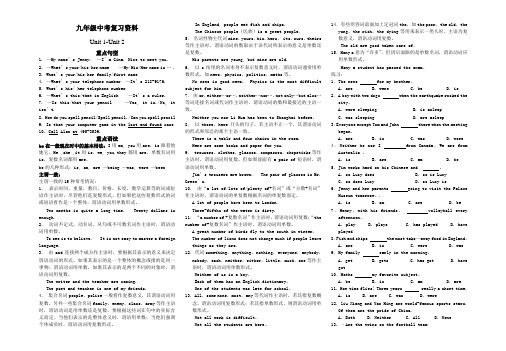
九年级中考复习资料Unit 1-Unit 2重点句型1. —My name’s Jenny. —I’m Gina. Nice to meet you.2. —What’s your/his/her name —My/His/Her name is ….3. What’s your/his/her family/first name4. —What’s your telephone number —It’s 218-9176.5. What’s his/ her telephone number6. —What’s this/that in English —It’s a ruler.7. —Is this/that your pencil —Yes, it is./No, it isn’t.8. How do you spell pencil/Spell pencil./Can you spell pencil9. Is that your computer game in the lost and found case10. Call Alan at 495-3539.重点语法be在一般现在时中的基本用法:I用am, you用are,is跟着他她它。
He ,she ,it用is,we, you they都用are。
单数名词用is,复数名词都用are。
be的几种形式:is, am, are —being —was, were —been主谓一致:主谓一致的15种常考情况:1.表示时间,重量,数目,价格,长度,数学运算等的词或短语作主语时,尽管他们是复数形式,但如果把这些复数形式的词或短语看作是一个整体,谓语动词用单数形式。
Two months is quite a long time. Twenty dollars is enough.2.动词不定式,动名词,从句或不可数名词作主语时,谓语动词用单数。
0871_人教新目标中考英语一轮复习素材:重难点突破专题 九全Units 1-2.doc_0

九年级(全)Units1—2by(九全册Unit1P1)【举例透析】①Last weekend,my parents went to London by air.上周末,我的父母乘飞机去了伦敦。
(by+交通工具,表示“通过……;乘……;由……”。
)②Students should go to bed by22:30at night.学生们应该在晚上十点半之前上床睡觉。
(by+时间名词,意为“在……之前”。
)③She was drinking orange juice by the swimming pool.她正在游泳池边喝橙汁。
(by+地点名词,意为“在……旁边”,相当于beside。
)④The book named Old Man and the Sea was written by Hemingway.《老人与海》这本书是海明威写的。
At last,we found out that the window was broken by Tom.最后,我们发现窗户是汤姆打破的。
(用于被动语态,意为“被;由”,引出动作发出者。
)⑤I study English by listening to tapes.我通过听磁带来学习英语。
(by+doing__sth.意为“通过……方式或途径做某事”,对by引导的方式状语提问用how。
)⑥其他短语:by oneself独自;by mistake无意地;by accident偶然地;by the end of到……末为止(C)1.We can save money______cooking our own meals instead of eating outside.A.withB.toC.byD.in(A)2.(咸宁中考改编)—President Xi Jinping paid an important visit to the US in2017.—And he was warmly welcomed______Donald Trump,the45th American president.A.byB.fromC.toD.with3.在我们学校,如果你在晚上九点半之前没有回到寝室,你会受到惩罚的。
(完整版)人教版新目标九年级全册英语复习资料

九年全册英复料◆unit1 How do you study for a test?一.复重点1.目言: talk about how to study,2.要求背部分 P3G ,P4-3a, P6-3a, P8-reading3.背表。
1. 4.复教材所有内容,复所做的,侧重基目。
二.知点:1.frustrate,frustrating,frustrated : frustrate 意思“使绝望,使沮,使” ,是及物,后来接; frustrating 意思“令人沮的,令人绝望的”。
是指某事令人绝望,含有主意,主一般物; frustrated 意思“沮的,绝望的”。
是指某物感觉绝望,相当于 disappointed,含有被意,主一般人。
短 be frustrated in 意思“遭到失”。
2.介 by , with, in , on 表方式 : by+交通工具(注意不冠),by+doing sth 通⋯方式;with+ 工具,with a pen, with+人体部位, with our eyes;in +言,in English, in+物资料, in ink (墨水) =by pen;on+器或媒介 on TV3.Ever 的用法:ever 相当于 at any time,意思“曾”。
同always,反never.常于在达成的一般疑句及条件状从句,其余状况下也有所使用。
1)用于在达成的一般疑句中。
Have you ever been to Shanghai? )2用于条件状从句。
If you ever hear from her, please tell me about it.3)用于一般在的疑句中。
Do you ever talk to your English friends?4)用于否认句。
No man ever returned from here.5)用于必定句中,表示“经常,是” ,常使用 always.注意: ever 和 always 的反都是 never。
最新人教新目标中考英语分册复习:九年级全一册Units3-4 精品课件
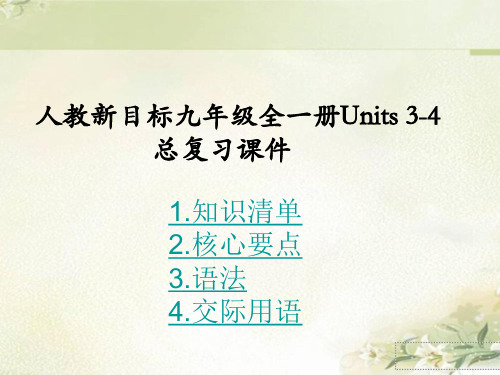
(2)direct的派生词: directly adv. 直接地;径直地 director n. 经理;导演 direction n. 指示;指导(不可数)
用法说明;操作指南(可数) 方向;方位(可数) 用direct的适当形式填空。
(1)He answered me very _d_i_r_e_ct_l_y_. (2)I gave him full _d_i_re_c_t_io__n_s_ to help him
人教新目标九年级全一册Units 3-4 总复习课件
1.知识清单 2.核心要点 3.语法 4.交际用语
(一)单词 1. _b_e_si_d_e____ prep. 在……旁边 2. _p_a_r_d_o_n_ v. 原谅 3. _r_u_sh______ v. & n. 仓促;急促 4. suggest→(名词)_s_u_g_ge_s_t_io_n_ 5. centre→(形容词)__c_e_n_t_r_al__
6. _fa_s_c_i_n_a_ti_n_g_ adj. 迷人的;机具吸引力的 7. crowded → (反义词) _u_n_c_r_o_w_d_e_d__ 8. _c_o_n_v_e_n_i_e_n_t_ adj. 方便的;便利的 9. polite→ (副词) p__o_li_te_l_y__→ (反义词)
8. silent adj. 不说话的;沉默的 [拓展] silently adv. 沉默地 silence n. 沉默 in silence 沉默地 根据句意及汉语提示完成句子。
(1) The teacher seemed angry. He wanted us to keep _s_il_e_n_t__ (沉默的), but we didn’t stop talking.
中考复习新目标英语九年级 Units 5~6
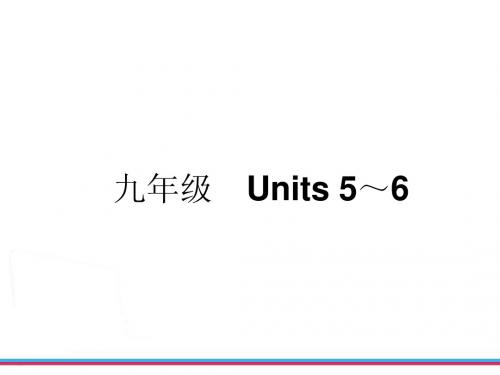
基础知识梳理 要点各个击破
跟踪训练
首页
按ESC退出
3.(2012· 湖州)—What kind of movies do you like? —I like the movies ________ are about Chinese history.ຫໍສະໝຸດ A.whoB.whom
C.whose
D.which
☞重点短语 1.belong to 属于 2.make up 形成;组成;构成 3.use up 用完;用光;耗尽 4.turn off 关掉 5.remind of 提醒;使记起 6.over the years 多年来 7.on display 展览;陈列 8.to be honest(作插入语)老实说;说实在的 9.be bad for 对„„有害 10. stay away from 与„„保持距离 11. be in agreement 意见一致 12. keep healthy 保持健康
☞金牌句型 1.It must belong to Carla. 它一定属于卡拉。 2.It can't be John's. 它不可能是约翰的。 3.He could be running for exercise. 他可能正在跑步锻炼身体。 4.There must be something visiting the homes...一定有东西在这些房子边逗留„„ 5.I like music that I can dance to. 我喜欢能随之跳舞的音乐。 6.It does have a few good features, though.但是它确实有几处亮点。 7.Whatever you do, don't miss this exhibition. 无论你做什么,都不要错过这次展览。
中考英语(人教新目标)一轮复习基础考点一遍过 九年级上册 Unit 3

基础自查
考点汇聚
随堂演练
课后作业
9.Every dog ________ ________ ________. (人人都有幸运的时候。) 答案:has its day
基础自查
考点汇聚
随堂演练
课后作业
10.________ ________ ________ ________?(你的旅程怎么样?) 答案:How was your trip
基础自查
考点汇聚
随堂演练
课后作业
5.________ ________? (什么事?) 答案:What's up
基础自查
考点汇聚
随堂演练
课后作业
6.Excuse me, ________ ________ ________ give me a ride to the airport? (打扰一下,你能否顺便捎我去机场?)
基础自查
考点汇聚
随堂演练
课后作业
8.give sb. a ride 让某人搭便车 9.get on 上车 10.do_some_research 做调查 11.at_times 有时,间或 12.compare ... to ... 把……比作…… 13.make_mistakes 犯错误 14.keep_a_diary 写日记 15.take_a_breath 吸一口气 16.as_long_as 只要 17.stick_to_(doing)_sth. 坚持(做)某事
答案:what to do; feel like giving up
基础自查
考点汇聚
随堂演练
课后作业
9.我确信只要坚持,你一定会取得很大的进步。 I'm sure that you will make great progress ________ ________ ________ you stick to them.
英语中考复习新目标九年级 Units 1-2

1. aloud aloud, loud和loudly
26. _____________________ 小菜一碟。
give sb. a treat 27. _____________________ 你活该。
28. _____________________ 用英语记日记
improve reading speed / speaking skills
It’s a piece of cake.
bit by bit body language
10. ______________ 叫出 / 喊出
call out 11. ______________ connect ... with… 把……和……连接 / 联系起来
12. ______________ 圣诞节
13. ______________ 平安夜
It serves you right. keep a diary in English
Knowledge comes from questioning. 29. ________________________________ 知识源于质疑。
30. _____________ 摆开;布置
31. _____________ 学习习惯
42. ________________ 独自
中考复习 人教版九年级英语 全册知识点归纳及习题

新人教版九年级英语全册知识点归纳及习题(最新)Unit 1 How can we become good learners?短语总结:1. good learners 优秀的学习者2. work with friends 和朋友一起学习3. study for a test 备考4.have conversations with 与……交谈5.speaking skills 口语技巧6.a little 有点儿7.at first 起初起先8.the secret to......, .......的秘诀9.because of 因为10.as well 也11.look up (在词典中等)查阅;抬头看12.so that 以便,为了13.the meaning of ……的意思14.make mistakes 犯错误15.talk to 交谈16.depend on 依靠依赖17.in common 共有的18.pay attention to 注意关注19.connect ……with ……把……联系。
20.for example 例如21.think about 考虑22.even if 即使尽管纵容23.look for 寻找24.worry about 担心担忧25.make word cards 制作单词卡片26.ask the teacher for help 向老师求助27.read aloud 大声读28.spoken english 英语口语29.give a report 作报告30.word by word 一字一字地31.so……that 如此……以至于32.fall in love with 爱上33.something interesting 有趣的事情34.take notes 记笔记35.how often 多久一次36.a lot of 许多37.the ability to do sth. 做某事的能力38.learning habits 学习习惯39.be interested in 对……感兴趣40.get bored 感到无聊41.be good at 在……方面擅长42.be afraid of 害怕43.each other 彼此互相44.instead of 代替而不是二.用法集萃1. by doing sth 通过做某事2.it +be+adj+to do sth 做某事是……的3.finish doing sth 完成某事4.what about doing sth?做某事怎么样?5.try to do sth 尽力做某事6.the +比较近,the+比较近越……,就越……7.find it+adj+to do sth 发现做某事8.be afraid of doing sth 害怕做某事9.help sb (to) do sth 帮助某人做某事10.practice doing sth 练习做某事11.keep doing sth 一直做某事12.be afraid to do sth 害怕做某事13.begin to do sth 开始做某事14.want to do sth 想要做某事15.need to do sth 需要做某事16.remember to do sth 记得做某事17.shoot 射(射着,射死等表结果)18.shoot at(瞄准)射Unit1 检测题一.单项选择1.—_______ do you study English? —By listening to tapes.A. HowB. WhereC. WhenD. Why2.You can improve your English practicing more. A.by B.with C.of D.in3. Why not practice your _________English in _________ English-speaking country?A. speaking, aB. speaking, anC. spoken, an4. ________conversations with others is one of the secrets to _________a successful learner.A. Practice, becomeB. Practice, becomingC. Practicing, becoming5 ---There’re a few new words in the article? ---What about _________in your dictionary?A. looking it upB. looking up itC. looking them up6. We’ll go out to play _________ it rains tomorrow. A. so B. unless C. because7. Can you ________which is the right answer to the question? A. look for B. find C. find out8. Jenny used to be afraid to ________in class, so she always ________nothing.A. speak, talkedB. speak, saidC. say, spoke9.— Why not listen to BBC news to improve your listening skills?—It’s ________ difficult _______ I can’t follow. A. too; to B. so; that C. such; that10. A good learner often thinks about ________he needs to practice more.A. thatB. whatC. how11.--I’m going to listen _______the tape. --OK. Remember to listen ________the key words.A. to, toB. to ,forC. for, to12. ________or not you can learn well depends on your learning habits.A. IfB. WeatherC. Whether13. I have finished _________my report. May I start to learn ________the guitar?A. writing, playingB. writing, to playC. to write, playing14. ---I often make mistakes _______grammar. ---Why not ask your teacher _______help?A. in, toB. in, forC. at, to15. _________write down the new words in your notebook?A. Would you likeB. How aboutC. Could you please16. ---Jack used to have ________writing practice. ---Yes, and he had learned _________.A. a lot of, a lot ofB. a lot of, a lotC. a lot, a lot of17. The more careful you are, ________mistakes you’ll make.A. fewer B. the fewer C. the less18. Good learners aren’t afraid _______mistakes. Instead, they learn ________mistakes.A. of making, inB. to make, fromC. to make, in19. For the first time, pay attention _________quickly to get the main ideas.A. to readB. readingC. to reading20.I discovered that listening to is the secret language learning.A.something intresting, toB.interesting something, toC.something interested, ofD.interested something of21.Jenny found it very easy English well. A.learning B.to learn C.learn D.learned22. He_____ with the girl with golden hair and will soon get married____ her.A. falls in love; toB. is in love; toC. loves; withD. loves; to23. My father thinks _____ is a great way to learn English.A. study grammar.B. I study grammar.C. studying grammar.D. studies grammar24 Why not ___ your teacher for help when you can’t finish _____ it by yourself?A. ask; writeB. to ask; writingC. ask; writingD. asking; write25. I wonder if I can learn English well.—. All things are difficult before they are easy.A. I am afraid soB. You’re slowC. It takes timeD. It’s a piece of cake26 You’ll find _____________ easy to learn it well. A. that B. its C. it D. this27. –I don’t have a partner to practice English ______________.---Why not join an English language club to practice _______________?A. /; speakingB. with; to speakC. /; to speakD. with; speaking28. ---She hardly makes mistakes _________English grammar.---No, it seems that she was born ________the ability to learn languages.A. in, withB. with, inC. in, inD. with, with二用所给单词的适当形式填空。
人教版新目标九年级全册英语 Unit 6 单元语法知识点考点复习提纲
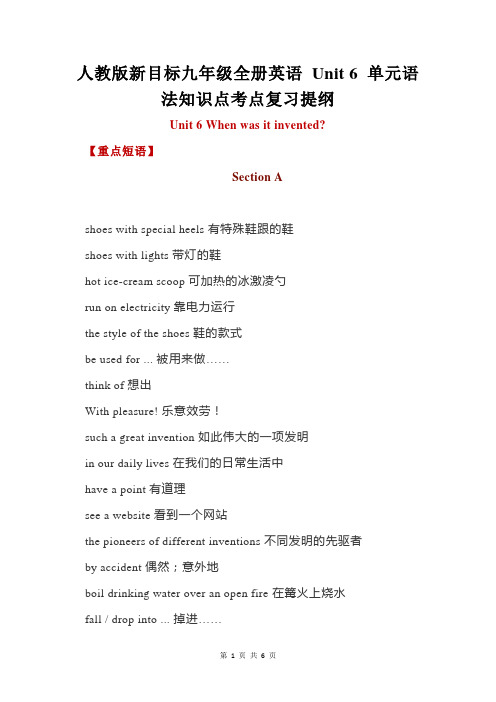
人教版新目标九年级全册英语Unit 6 单元语法知识点考点复习提纲Unit 6 When was it invented?【重点短语】Section Ashoes with special heels 有特殊鞋跟的鞋shoes with lights 带灯的鞋hot ice-cream scoop 可加热的冰激凌勺run on electricity 靠电力运行the style of the shoes 鞋的款式be used for ... 被用来做……think of 想出With pleasure! 乐意效劳!such a great invention 如此伟大的一项发明in our daily lives 在我们的日常生活中have a point 有道理see a website 看到一个网站the pioneers of different inventions 不同发明的先驱者by accident 偶然;意外地boil drinking water over an open fire 在篝火上烧水fall / drop into ... 掉进……produce a nice smell 产生一种香味the saint of tea 茶圣in less than 100 years 在不到一百年的时间里national drink 国饮take place 发生;出现tea culture 茶文化without doubt 毫无疑问;的确understand the nature of tea 了解茶的本质sell ... at a low price 低价卖……translate ... into ... 把……翻译成……all of a sudden 突然;猛地ring the bell 按门铃musical notes 乐符Section Bpotato chips 炸薯条;炸土豆片by mistake 错误地;无意中in the end 最后put lots of salt on ... 在……上面撒很多盐a much-loved and active sport 一种备受欢迎而且剧烈的运动more than 超过;多于in history 历史上a college teacher 一位大学老师divide ... into 把……分开get the ball in the other team’s basket把球投进对方篮筐at the same time 同时stop ... from doing ... 阻止……做……dream of 梦想;幻想;向往not only ... but also ... 不但……而且……the number of ... ……的数量look up to these basketball heroes 钦佩 / 仰慕这些篮球英雄encourage sb. to do sth. 鼓励某人做某事achieve their dreams 实现他们的梦想come up with 提出;想出lead to 导致【考点详解】1. invent v. 发明inventor n. 发明家invention n. 发明2. be used for doing 用来做…(是被动语态)(这个短语的考点有两点,一是used for的意思,二是for后面用动名词)Pens are used for writing. 笔是用来写的。
人教版新目标英语九年级上册期中复习知识归纳

期中知识要点复习单选部分1. 人称代词:主格、宾格、形容词性物主代词、名词性物主代词2. 时间介词:on、in、at3. 特殊疑问词:where、when、what、which、how4. 连词:and、or、but、so、unless、although5. 情态动词及疑问句回答:must、need、can、may、should6. 形容词或副词:原级、比较级、最高级7. 非谓语动词:to do、do、doing8. 时态:一般将来时、一般过去时、现在进行时、过去进行时、现在完成时9. 不定代词:复合不定代词、all、each、both,much、many、(a)little、(a)few、others、another、either、neither10. 被动语态11. 主将从现:if / as soon as12. 宾语从句Unit 1完成句子—中考句型1. …怎么样?How about + n./doing sth.2. 太…而不能…too…to…3. 根本不,一点儿也不not…at all …4. 为什么不…?Why not + 动原?/ Why don’t y ou+ 动原?5. 对于某人来说做某事是…样的It’s + adj. for sb. to do sth.6. 因…而出名be famous for…7.让我们…吧Let’s + do重点词组by doing practice doing sth. ask sb. for sth.the best way to do sth.watch sb. do sth. have fun doing sth. get excited about end up doing sth.forget to do sth. be afraid to do/of doing decide to do sth. try to do sth.one of +the 最高级+ 名词复数look it/them up be angry with sb.complain about learn about try one’s best to do sth.Unit 2完成句子—中考句型1. 过去常常做某事used to do sth.2.花时间/钱做某事spend 时间/钱doing sth.3. 尽可能…as…as possible4. 送/寄给某人某物send sth. to sb.=send sb. sth.5. 使某人…样make sb. + adj.重点词组be interested in play the piano speak in front of others hate doing sth. worry about mind doing sth. take sth. to sb.= take sb. sth. give up doing sth. make a decision take pride in pay (more) attention toUnit 3完成句子—中考句型1. 我认为…不…I don’t think +从句2. 停止做某事stop doing sth.3. 结束做某事finish doing sth.4. 愿意做某事would like to do sth.5. 对…有好处be good for6. 使某人/某物保持某种状态keep sb./sth. + adj.7. …和…都both…and…8. 和…一样…as…as…9. 看到某人做/正在某事see sb. do/doing sth.重点词组serious enough need to do sth. instead of allow sb. to do sth.be allowed to do sth. care about stay up clean upbe strict with sb. learn from sb. concentrate on teach sb. to do sth. Some…,others…agree with sb.achieve one’s dream get in the way ofUnit 4完成句子—中考句型1. …迟到be late for2. 帮助某人做某事help sb. do sth. / help sb. with sth.3. 要求/让某人做某事ask sb. to do sth.4. 向某人借某物borrow sth. from sb. = borrow sb. sth.5. 因…而出名be famous for重点词组take a walk give a speech wait for start doing sth. find outget along with think about let sb. down come up with offer sth. tosb.Unit 5完成句子—中考句型1. 听见某人正在做某事hear sb. doing sth.2. 给某人看某物show sth. to sb.3. 那儿有…There be…重点词组must be belong to sb. too much get on use up期中作文复习注意:请对照汉语进行翻译练习。
人教版新目标初中英语中考单词记忆(完整版)

新目标初中英语单词记忆法词汇表目录新目标初中英语单词记忆法词汇表 (1)一、分类记忆法 (1)二、构词记忆法 (8)三、同义近义词记忆法 (19)四、反义词记忆法 (19)五、形近词记忆法 (21)六、联想记忆法 (23)附录:一、不规则形容词副词比较级与最高级 (25)二、不规则名词复数形式 (25)三、不规则动词表 (26)一、分类记忆法名词(1)星期(week)Monday(星期一)、Tuesday(星期二)、Wednesday(星期三)、Thursday(星期四)、Friday(星期五)、Saturday(星期六)、Sunday(星期天)(2)月份(month)January(一月)、February(二月)、March(三月)、April(四月)、May(五月)、June(六月)、July(七月)、August(八月)、September(九月)、October(十月)、November(十一月)、December(十二月)(3)季节(season)spring(春天)、summer(夏天)、autumn(秋天)、winter(冬天)(4)时间(time)second(秒)、minute(分)、hour(小时)、day(天)、night(夜)、week (星期)、month(月份)、year(年)、century(世纪)(5)国家(country)China(中国)、Japan(日本)、England(英国)、India(印度)、Canada(加拿大)、America / the United States(美国)、Australia(澳大利亚)、Germany(德国)、Russia(俄罗斯)、France(法国)(6)大洲(continent)Asia(亚洲)、Africa(非洲)、America(美洲)、Europe(欧洲)、Oceania(大洋洲)(7)方位(direction)east(东)、south(南)、west(西)、north(北)、left(左)、right(右)(8)交通工具(transport)bike / bicycle(自行车)、bus(公共汽车)、car(小汽车)、jeep(吉普车)、train(火车)、ship(轮船)、plane(飞机)(9)饮食(meal)breakfast(早餐)、lunch(午餐)、supper(晚餐)、dinner(正餐、晚餐)、snack(快餐)、picnic(野餐)(10)米面及肉类食品rice(米、米饭)、porridge(粥)、dumpling(饺子)、noodle【常用复数】(面条)、meat(肉)、beef(牛肉)、mutton(羊肉)、chicken(鸡肉)、egg(鸡蛋)(11)水果(fruit)Apple(苹果)、banana(香蕉)、pear(梨子)、orange(橙子)、strawberry (草莓)(12)蔬菜(vegetable)tomato(西红柿)、potato(马铃薯)、carrot(胡萝卜)、cabbage(洋白菜、卷心菜)、onion(洋葱)(13)零食(snack)chocolate(巧克力)、hamburger(汉堡包)、cake(蛋糕)、bread(面包)、mooncake(月饼)、ice cream(冰淇淋)、cheese(奶酪)、salad(沙拉)、dessert(甜食)、candy(糖果)、biscuit(饼干)、pie(馅饼)、cheese(干酪;奶酪)(14)饮料(drink)juice(果汁)、milk(牛奶)、tea(茶)、green tea(绿茶)、coffee(咖啡)(15)调料(relish)butter(黄油)、sauce(酱油)、sugar(糖)、salt(盐)(16)学习用品pen(钢笔)、pencil(铅笔)、eraser(橡皮擦)、ruler(直尺)、knife(小刀)(17)颜色(color)red 红色(的)、yellow黄色(的)、blue蓝色(的)、green绿色(的)、black黑色(的)、white白色(的)、orange橙黄色(的)、brown棕色(的)、褐色(的)、pink粉红色(的)、purple紫色(的)、gray灰色(的)(18)衣着clothes(衣服)、hat(帽子)、shirt(衬衫)、T-shirt(男衬衫)、coat(外套、上衣)、raincoat(雨衣)、uniform(制服)、skirt(裙子)、dress(裙子、衣服)、trousers(裤子)、pants(裤子)、jeans(牛仔裤)、shorts(短裤)、sock(袜子)、shoe(鞋子)(19)科目(subject)Chinese(汉语)、math(数学)、English(英语)、history(历史)、geography(地理)、biology(生物)、physics(物理)、chemistry(化学)、P.E.(体育)(20)身体部位(body)head(头)、hair(头发)、neck(脖子)、eye(眼睛)、nose(鼻子)、mouth(嘴巴)、tooth(牙齿)、ear(耳朵)、face(脸)、arm(手臂)、hand(手)、finger(手指)、heart(心)、back(背部)、knee(膝盖)、leg(腿)、foot(脚)(21)亲属father(父亲)、mother(妈妈)、parents(父母)、grandfather / grandpa(爷爷、外公)、grandmother / grandma(奶奶、外婆)、grandparents(爷爷奶奶、外公外婆)、brother(哥、弟)、sister(姐、妹)、cousin堂(表)兄弟、堂(表)姐妹、husband(丈夫)、妻子(wife)、son(儿子)、daughter(女儿)、uncle(叔、伯、舅、姨夫、姑父)、aunt(姨母、姑母、伯母、婶母、舅母)(22)动物(animal)lion(狮子)、tiger(老虎)、elephant(大象)、camel(骆驼)、cow(奶牛)、pig(猪)、fox(狐狸)、snake(蛇)、duck(鸭子)、chicken(鸡)、hen(母鸡)、bird(小鸟)、rabbit(兔子)、panda(熊猫)、deer(鹿)、giraffe(长颈鹿)、sheep(羊)、fish(鱼)、ant(蚂蚁)、mouse (mice) / rat(老鼠)、dog(狗)、cat(猫)、monkey(猴子)、pig(猪)(23)职业teacher(老师)、doctor(医生)、nurse(护士)、policeman(男警察)、policewoman(女警察)、reporter(记者)、shop assistant(店员)、bank clerk(银行职员)、waiter(服务员)、scientist(科学家)、student(学生)、farmer(农民)、fisherman(渔夫)、cook(厨师)、barber(理发师)(24)公共场所shop / store(商店)、bank(银行)、hospital(医院)、police station(警察局)、TV station(电视站)、stop(车站)、cinema(电影院)、theater(戏剧院)、hotel(旅馆)、restaurant(餐馆)、factory(工厂)、company(公司)、market(市场)、supermarket(超市)、museum(博物馆)、post office(邮局)、school(学校)、airport(飞机场)、church(教堂)(25)学校(school)primary school(小学)、middle school(中学)、junior high school(初中)、senior high school(高中)、university(大学)(26)房间(room)livingroom(起居室、客厅)、bedroom(卧室)、bathroom(洗澡房)、kitchen(厨房)(27)宇宙sun(太阳)、moon(月亮)、star(星星)、earth(地球)、sky(天空)、air(空气)、rain(雨)、cloud(云)、wind(风)、snow(雪)(28)天气(weather)sunny(晴朗的)、rainy(多雨的)、cloudy(多云的、阴天的)、windy(有风的)、snowy(多雪的)(29)运动(sport)basketball(篮球)、football(足球)、volleyball(排球)、baseball(棒球)、tennis(网球)、table tennis / ping-pong(乒乓球)、badminton(羽毛球)(30)乐器drum(鼓)、trumpet(喇叭)、piano(钢琴)、violin(小提琴)、guitar(吉他)二、构词记忆法1、合成法由两个或者两个以上的词合成新词,这种构词法叫做合成法。
初中英语人教新目标九年级全一册Grammar形容词原级比较级最高级中考复习课件

A. good
B. well
C. better
D. gooder
7. This one is too large. Can you show me a
___D__one?
A. larger
B. large
C. small
D. smaller
8. Do you think March is ___A_than January?
注 :在形容词比较级前还可用much, even,
still, a little来修饰, 表示“……的多”, “甚至……”, “更……”, “……一些”。 e.g. 1) This city is much more beautiful than
before.
2) She’s a little more outgoing than me.
Yes, it’s __ warmer.
A. better, a little B. well, much
C. worse, very
D. nicer, quite
9. -- Which of the caps will you take?
--I’ll take ___B____. one for my father the other for my brother.
3) The movie is even more interesting.
三、形容词最高级的用法。
1、主语+谓语+the+形容词的最高级+of/in..等 短 语。表示“主语是 .. 中最 . . 的”。
e.g Tom is the tallest of all the students. This book is the most interesting of all.
人教新目标版中考英语九年级全册Unit1 2词汇拓展复习阅读及答案
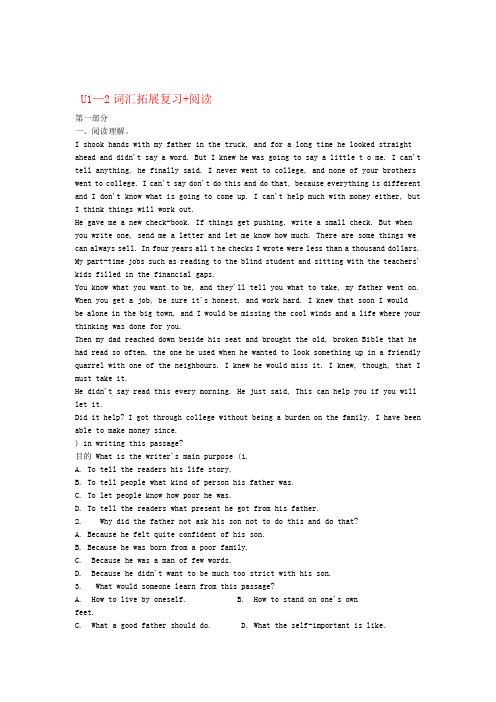
U1—2词汇拓展复习+阅读第一部分一、阅读理解。
I shook hands with my father in the truck, and for a long time he looked straight ahead and didn't say a word. But I knew he was going to say a little t o me. I can't tell anything, he finally said. I never went to college, and none of your brothers went to college. I can't say don't do this and do that, because everything is different and I don't know what is going to come up. I can't help much with money either, but I think things will work out.He gave me a new check-book. If things get pushing, write a small check. But when you write one, send me a letter and let me know how much. There are some things we can always sell. In four years all t he checks I wrote were less than a thousand dollars. My part-time jobs such as reading to the blind student and sitting with the teachers' kids filled in the financial gaps.You know what you want to be, and they'll tell you what to take, my father went on. When you get a job, be sure it's honest, and work hard. I knew that soon I wouldbe alone in the big town, and I would be missing the cool winds and a life where your thinking was done for you.Then my dad reached down beside his seat and brought the old, broken Bible that he had read so often, the one he used when he wanted to look something up in a friendly quarrel with one of the neighbours. I knew he would miss it. I knew, though, that I must take it.He didn't say read this every morning. He just said, This can help you if you will let it.Did it help? I got through college without being a burden on the family. I have been able to make money since.) in writing this passage?目的 What is the writer's main purpose (1.A. To tell the readers his life story.B. To tell people what kind of person his father was.C. To let people know how poor he was.D. To tell the readers what present he got from his father.2. Why did the father not ask his son not to do this and do that?A. Because he felt quite confident of his son.B. Because he was born from a poor family.C. Because he was a man of few words.D. Because he didn't want to be much too strict with his son.3. What would someone learn from this passage?A. How to live by oneself.B. How to stand on one's ownfeet.C. What a good father should do.D. What the self-important is like.4. What may be the proper Chinese for the underlined part in the passage?A. 闲暇时光.B. 学费.C. 经济不足.D. 精神空虚.5. What kind of book did the Bible seem to be to the writer's father?A. It was a book which told you how you should get on well with others.B. There were many good examples for you to copy in it.C. It was a book that told you how to get a good job and a good future.It was a good book that could help you when you were in trouble.D.参考答案:1. D 2. A 3. B 4.C 5. D二、任务型阅读。
- 1、下载文档前请自行甄别文档内容的完整性,平台不提供额外的编辑、内容补充、找答案等附加服务。
- 2、"仅部分预览"的文档,不可在线预览部分如存在完整性等问题,可反馈申请退款(可完整预览的文档不适用该条件!)。
- 3、如文档侵犯您的权益,请联系客服反馈,我们会尽快为您处理(人工客服工作时间:9:00-18:30)。
新目标英语人教版九年级中考复习资料2014年九年级中考复习资料九年级中考复习资料Un it 1-U nit 2重点句型1. —My name ' Jenny. —I'm Gina. Nice to meet you.2. —What 'syour/his/her name? —My/His/Her name is ….3. What' your/his/her family/first n ame?4. —What 'your telephone number? —It' 218-9176.5. What' his/ her telepho ne nu mber?6. —What 'this/that in En glish? —It 'a ruler.7. —Is this/that your pencil? —Yes, it is./No, it isn '8. How do you spell pen cil?/Spell pen cil./Ca n you spell pen cil?9. Is that your computer game in the lost and found case?10. CaJJ. Alan a!495-3539.重点语法be在一般现在时中的基本用法:I用am, you用are, is跟着他她它。
He ,she ,it用is,we, you they都用are。
单数名词用is,复数名词都用are。
be 的几种形式:is, am, are —being —was, were —been主谓一致:主谓一致的15种常考情况:1. 表示时间,重量,数目,价格,长度,数学运算等的词或短语作主语时,尽管他们是复数形式,但如果把这些复数形式的词或短语看作是一个整体,谓语动词用单数形式。
Two mon ths is quite a long time. Twenty dollars is eno ugh.2. 动词不定式,动名词,从句或不可数名词作主语时,谓语动词用单数。
To see is to believe. It is not easy to master a foreig n Ian guage.3. 由and连接两个成分作主语时,要根据其表示的意义来决定谓语动词的形式。
如果其表示的是一个整体的概念或指的是同一事物,谓语动词用单数,如果其表示的是两个不同的对象时,谓语动词用复数。
The writer and the teacher are coming.The poet and teacher is one of my frien ds.4. 集合名词people,police 一般看作复数意义,其谓语动词用复数。
另外一些集合名词family,enemy,class,army等作主语时,谓语动词是用单数还是复数,要根据这些词在句中的实际含义而定。
当他们表示的是整体意义时,谓语用单数;当他们强调个体成员时,谓语动词用复数形式。
In En gla nd, people eat fish and chips.The Chinese people (民族)is a great people.5. 名词性物主代词mine,yours,his,hers,its,ours,theirs等作主语时,谓语动词的数取决于该代词所表示的意义是单数还是复数。
His pare nts are young, but mine are old.6. 以s结尾的名词本身不表示复数意义时,谓语动词通常用单数形式,女口news,physics,politics,maths 等。
No n ews is good n ews. Physics is the most difficult subject forhim.7. 由or,either…or…,neither…nor…,not only …but also…?等词连接名词或代词作主语时,谓语动词的数和最接近的主语一致。
Neither you nor Li Hua has bee n to Shan ghai before.& 以there,here开头的句子,若主语不止一个,其谓语动词的形式和邻近的那个主语一致。
There is a table and four chairs in the room.Here are some books and paper for you.9. trousers, clothes,glasses compasses chopsticks 等作主语时,谓语动词用复数。
但如果前面有a pair of短语时,谓语动词用单数。
Jim 'trousers are brow n. The pair of glasses is Mr. Green '.10. 由"a lot of/lots of/plenty of+名词”或"分数+名词”作主语时,谓语动词的单复数根据名词的单复数而定。
A lot of people have bee n to London.Three-fifths of the water is dirty.11. "a number of +复数名词”作主语时,谓语动词用复数;“ thenumber of+复数名词”作主语时,谓语动词用单数。
A great nu mber of birds fly to the south in win ter.The nu mber of lions does not cha nge much if people leave things asthey are.12. 代词someth ing,any thi ng,nothing,every one, an ybody,nobody,each,neither,either,little,much,one 等作主语时,谓语动词用单数形式。
Neither of us is a boy。
Each of them has an English dictionary 。
One of the students was late for school。
13. All,some none,most,any等代词作主语时,若其指复数概念,谓语动词用复数形式;若其指单数形式,则谓语动词用单Not all work is difficult 。
Not all the stude nts are here。
14. 有些形容词前面加上定冠词the,如the poor,the old,the yong,the rich,the dying等用来表示一类人时,主语为复数意义,谓语动词用复数。
The old are good take n care of。
15. Many a意为“许多”,但因后面跟的是单数名词,谓语动词应用单数形式。
Many a stude nt has passed the exam练习:1. The news ______ for my brother。
A. areB. wereC. beD. is2. ________________________ A boy with two dogs when theearthquake rocked the city。
A. were sleep ingB. is asleepC. was sleep ingD. are asleep3. Every one except Tom and Joh n ______ there whe n the meet ingbegan。
A. areB. isC. was4. ____________________ Neither he nor I from Canada。
We arefrom Australia 。
A. isB. areC. amD. be5. Jim works hard on his Chinese and ________ 。
A. so Lucy doesB. so is LucyC. so does LucyD. so Lucy is6. Jenny and her parents _______ g oing to visit the Palace Museumtomorrow。
.A. isB. amC. areD. be7. Henry,with his friends,________ v olleyball every after noon 。
A. playB. playsC. has playedD. have played8. ____________________ Fish and chips the most take—awayfood in England。
A. areB. isC. were9. My family early in the morning 。
A. getB. getsC. has gotD. have got10. Maths my favorite subject 。
A. beB. isC. amD. are11. How time flies! Three years ____ really a short time.A. isB. areC. wasD. were12. liu Xia ng and Yao Ming are world-famous sports stars. _____ Ofthem are the pride of China.A. BothB. NeitherC. AllD. None13. -\re the twins on the football team?-No, neither of them ______ on the team.A. isB. areC. wereD. be14. Not only his parents but also his grandfather _______ to alot ofplaces of in terest in our country since hey came here.A. has goneB. has bee nC. have goneD. have bee n15. There are enoug ___ in the fridge. We don 'tneed to buy any.A. milkB. tomatoesC. tomatosD. apple16. A report says hun dreds and thousa nds of trees ____ in the2014年九年级中考复习资料-2 -Amaz on rain forest last year.A. was cut dow nB. have bee n cut dow nC. were cut dow nD. had bee n cut dow nUn its3-4 复习要点1、介绍家庭成员This/That is my s ister/brother/mother …These/Those are my pare nts/gra ndpare nts …Is this/that your sister/brother it is./N(? Yte&n ' t.Are these/those your pare nts/gra ndpare nts …?Yes, they are. /No, they aren ' t.There are 3/4/5 …people in my family. They are my father, my mother,…and I.2、关于方位介词或短语表方位的介词或短语有:in,on ,un der,beh ind,n ear, next to,i nfront of,across from, …My book is on my desk, my pen is in my book …Where is the backpack/pencil It …?5 in/on/underWhere are the books/pe ns/balls The^are in/on/un der3、把…带去给某人take …to e.g:Please take these thingsto yoursister.把…带来给某人bring …to e.g:Can you bring my homeworkto school?二、代词(有两种:人称代词和物主代词。
